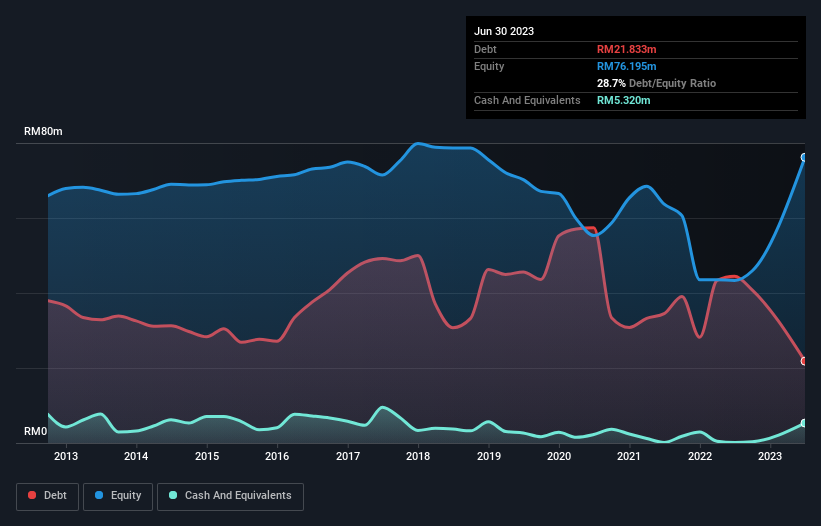- Malaysia
- /
- Commercial Services
- /
- KLSE:EURO
Here's Why Euro Holdings Berhad (KLSE:EURO) Can Afford Some Debt

Warren Buffett famously said, 'Volatility is far from synonymous with risk.' So it seems the smart money knows that debt - which is usually involved in bankruptcies - is a very important factor, when you assess how risky a company is. As with many other companies Euro Holdings Berhad (KLSE:EURO) makes use of debt. But the real question is whether this debt is making the company risky.
Why Does Debt Bring Risk?
Debt is a tool to help businesses grow, but if a business is incapable of paying off its lenders, then it exists at their mercy. Ultimately, if the company can't fulfill its legal obligations to repay debt, shareholders could walk away with nothing. However, a more frequent (but still costly) occurrence is where a company must issue shares at bargain-basement prices, permanently diluting shareholders, just to shore up its balance sheet. By replacing dilution, though, debt can be an extremely good tool for businesses that need capital to invest in growth at high rates of return. When we examine debt levels, we first consider both cash and debt levels, together.
See our latest analysis for Euro Holdings Berhad
What Is Euro Holdings Berhad's Debt?
You can click the graphic below for the historical numbers, but it shows that Euro Holdings Berhad had RM21.8m of debt in June 2023, down from RM44.5m, one year before. However, it does have RM5.32m in cash offsetting this, leading to net debt of about RM16.5m.

How Strong Is Euro Holdings Berhad's Balance Sheet?
Zooming in on the latest balance sheet data, we can see that Euro Holdings Berhad had liabilities of RM48.3m due within 12 months and no liabilities due beyond that. On the other hand, it had cash of RM5.32m and RM27.1m worth of receivables due within a year. So its liabilities total RM15.9m more than the combination of its cash and short-term receivables.
Given Euro Holdings Berhad has a market capitalization of RM95.7m, it's hard to believe these liabilities pose much threat. However, we do think it is worth keeping an eye on its balance sheet strength, as it may change over time. The balance sheet is clearly the area to focus on when you are analysing debt. But it is Euro Holdings Berhad's earnings that will influence how the balance sheet holds up in the future. So if you're keen to discover more about its earnings, it might be worth checking out this graph of its long term earnings trend.
Over 12 months, Euro Holdings Berhad made a loss at the EBIT level, and saw its revenue drop to RM142m, which is a fall of 6.6%. That's not what we would hope to see.
Caveat Emptor
Importantly, Euro Holdings Berhad had an earnings before interest and tax (EBIT) loss over the last year. Its EBIT loss was a whopping RM16m. When we look at that and recall the liabilities on its balance sheet, relative to cash, it seems unwise to us for the company to have any debt. So we think its balance sheet is a little strained, though not beyond repair. However, it doesn't help that it burned through RM26m of cash over the last year. So in short it's a really risky stock. When analysing debt levels, the balance sheet is the obvious place to start. But ultimately, every company can contain risks that exist outside of the balance sheet. To that end, you should learn about the 5 warning signs we've spotted with Euro Holdings Berhad (including 2 which are a bit unpleasant) .
When all is said and done, sometimes its easier to focus on companies that don't even need debt. Readers can access a list of growth stocks with zero net debt 100% free, right now.
If you're looking to trade Euro Holdings Berhad, open an account with the lowest-cost platform trusted by professionals, Interactive Brokers.
With clients in over 200 countries and territories, and access to 160 markets, IBKR lets you trade stocks, options, futures, forex, bonds and funds from a single integrated account.
Enjoy no hidden fees, no account minimums, and FX conversion rates as low as 0.03%, far better than what most brokers offer.
Sponsored ContentValuation is complex, but we're here to simplify it.
Discover if Euro Holdings Berhad might be undervalued or overvalued with our detailed analysis, featuring fair value estimates, potential risks, dividends, insider trades, and its financial condition.
Access Free AnalysisHave feedback on this article? Concerned about the content? Get in touch with us directly. Alternatively, email editorial-team (at) simplywallst.com.
This article by Simply Wall St is general in nature. We provide commentary based on historical data and analyst forecasts only using an unbiased methodology and our articles are not intended to be financial advice. It does not constitute a recommendation to buy or sell any stock, and does not take account of your objectives, or your financial situation. We aim to bring you long-term focused analysis driven by fundamental data. Note that our analysis may not factor in the latest price-sensitive company announcements or qualitative material. Simply Wall St has no position in any stocks mentioned.
About KLSE:EURO
Euro Holdings Berhad
An investment holding company, engages in the manufacture, marketing, and trading of furniture.
Excellent balance sheet and good value.
Market Insights
Community Narratives



